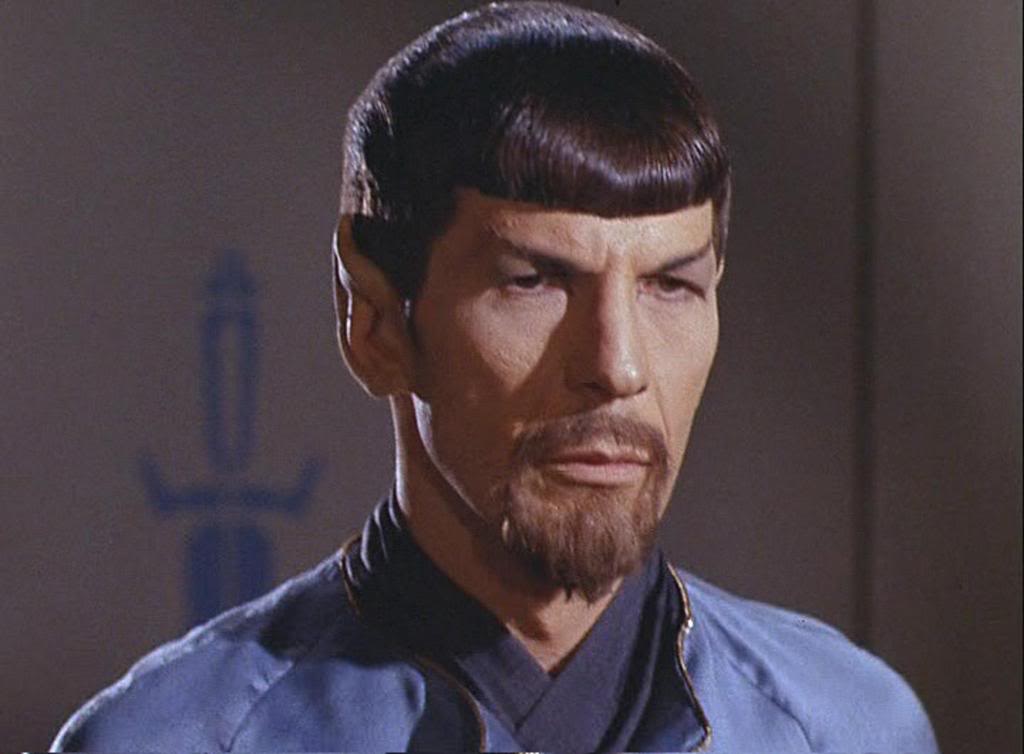Star Trek: 50th Anniversary
Boldly going for a half-century.
Moderators: kiore, Blip, The_Metatron
•
86 posts
• Page 1 of 5 • 1, 2, 3, 4, 5
Star Trek: 50th Anniversary
The original series launched on 8 September 1966, starting a sci-fi phenomenon that's still going strong...
-

Mike_L - Banned User
- THREAD STARTER
- Posts: 14455

- Country: South Africa
Re: Star Trek: 50th Anniversary
WEEEE!
First I saw Star Trek on ORF - Österreich TV :) which we were able to receive being close to borders sometimes in 80's. Did not understand it much, or rather almost nothing but at least there were Mars bar ads during the show. Not sure why communists did not like it too because Star Trek is pretty communist.
First I saw Star Trek on ORF - Österreich TV :) which we were able to receive being close to borders sometimes in 80's. Did not understand it much, or rather almost nothing but at least there were Mars bar ads during the show. Not sure why communists did not like it too because Star Trek is pretty communist.
- tuco
- Posts: 16040
Re: Star Trek: 50th Anniversary
tuco wrote:Not sure why communists did not like it too because Star Trek is pretty communist.
"You have to be a real asshole to quote yourself."
~ ScholasticSpastic
~ ScholasticSpastic
-

ScholasticSpastic - Name: D-Money Sr.
- Posts: 6354
- Age: 48

- Country: Behind Zion's Curtain

Re: Star Trek: 50th Anniversary
Which is probably why they did not like it. What they did had little to do with communism as andyx1205 would educate us about if he was still around. In fact, communism is not possible without a) infinite* source of energy b) energy to matter converters. Fucking Marx, how come he did not see it? ;)
---
edit: for humans*
---
edit: for humans*
Last edited by tuco on Sep 08, 2016 7:19 pm, edited 1 time in total.
- tuco
- Posts: 16040
Re: Star Trek: 50th Anniversary
50 years and it's only hitting its stride now.

A most evolved electron.
-

Animavore - Name: The Scribbler
- Posts: 45107
- Age: 45


Re: Star Trek: 50th Anniversary
I dunno, that last movie was pretty crap.
"They call it the American dream, because you have to be asleep to believe it." -- George Carlin
-

SafeAsMilk - Name: Makes Fails
- Posts: 14774
- Age: 44


Re: Star Trek: 50th Anniversary
Some people have indeed argued that Star Trek's United Federation of Planets is a Communist sort of society. Like this: Star Wars vs Star Trek Essays: The Economics of Star Trek
Is “Star Trek” Is A Communist Space Tyranny’s Idealized Vision Of Itself? | Jonathan Moeller, Pulp Writer
Star Trek and Democracy - Graeber : startrek
Is the United Federation in Star Trek a communist state? : communism101
Some people have argued the opposite:
Is Star Trek Really Anti-Libertarian?
Is “Star Trek” Is A Communist Space Tyranny’s Idealized Vision Of Itself? | Jonathan Moeller, Pulp Writer
Star Trek and Democracy - Graeber : startrek
Is the United Federation in Star Trek a communist state? : communism101
Some people have argued the opposite:
Is Star Trek Really Anti-Libertarian?
- lpetrich
- Posts: 750
- Age: 63


Re: Star Trek: 50th Anniversary
To do, is to be (Socrate)
To be, is to do (Sartre)
Do be do be do (Sinatra)
SUBWAY(1985)
To be, is to do (Sartre)
Do be do be do (Sinatra)
SUBWAY(1985)
- DougC
- Posts: 14920
- Age: 51

- Country: UNITED Kingdom

Re: Star Trek: 50th Anniversary
At the heart of the last article is this article: Who Mines The Dilithium? - http://hotair.com/greenroom/archives/20 ... dilithium/
However, its pointless to argue over physics of Star Trek in sense .. is it possible or not? In ST universe its possible, period. There are unlimited sources of energy, there are replicators, there are no money and no markets. As the article states: Its Gene Rodenberry’s liberal utopianism, which can be said to be similar to communism.
If we start pondering about physics, the whole ST universe is likely to collapse. No space travel. To me its silly avenue to pursue. There are infinite* sources of energy in the universe - black holes for example - and there is little we know about the universe in the first place. Who can predict, with any reliability, what will be 1 000, 10 000 or 1 000 000 years from now? Nobody.
Another point from the last article:
This is arse gravy as it does not hold truth even today, let alone in distant future. This is the link supporting the claim: http://www.dailyedge.ie/social-welfare- ... 2-Jan2012/
Robert Tracinski, the author, even links himself: http://thefederalist.com/2013/10/18/sta ... economics/ when making this point:
Its not complete rubbish and the author done some homework, but to me its .. cool story bro. I will wait the thousands years and see for myself how it works out ;)
However, its pointless to argue over physics of Star Trek in sense .. is it possible or not? In ST universe its possible, period. There are unlimited sources of energy, there are replicators, there are no money and no markets. As the article states: Its Gene Rodenberry’s liberal utopianism, which can be said to be similar to communism.
If we start pondering about physics, the whole ST universe is likely to collapse. No space travel. To me its silly avenue to pursue. There are infinite* sources of energy in the universe - black holes for example - and there is little we know about the universe in the first place. Who can predict, with any reliability, what will be 1 000, 10 000 or 1 000 000 years from now? Nobody.
Another point from the last article:
When people are provided with a guaranteed living, whether they work or not, they don’t generally devote themselves to self-improvement, the betterment of mankind, the writing of deathless poetry, or the peaceful exploration of the galaxy. Instead, they tend to stop working, striving, or putting forth any effort at all, not even the effort of changing out of their pajamas in the morning.
This is arse gravy as it does not hold truth even today, let alone in distant future. This is the link supporting the claim: http://www.dailyedge.ie/social-welfare- ... 2-Jan2012/
Robert Tracinski, the author, even links himself: http://thefederalist.com/2013/10/18/sta ... economics/ when making this point:
At best, what the advocates of statism get from Star Trek is the fantasy that some kind of “replicator” technology could actually make the welfare state work—or, more substantially, the illusion that economic communism can somehow be combined with individualism.
Its not complete rubbish and the author done some homework, but to me its .. cool story bro. I will wait the thousands years and see for myself how it works out ;)
- tuco
- Posts: 16040
Re: Star Trek: 50th Anniversary
When people are provided with a guaranteed living, whether they work or not, they don’t generally devote themselves to self-improvement, the betterment of mankind, the writing of deathless poetry, or the peaceful exploration of the galaxy. Instead, they tend to stop working, striving, or putting forth any effort at all, not even the effort of changing out of their pajamas in the morning.
This is from some poor people who show up in pajamas for interviews. Seems like they are short on money more than anything else. That gentleman should look at trust-fund babies, people who live off of inherited money and the like. Also look at noblepeople and aristocrats over history. That's IMO the best analogy for how people live in a Star Trek sort of society. Such a society's technology is good enough to enable people to live an upper-middle-class lifestyle without having to do much work.
Upper-middle-class?
Study: Money Buys Happiness When Income Is $75,000 - TIME
People say money doesn't buy happiness. Except, according to a new study from Princeton University's Woodrow Wilson School, it sort of does — up to about $75,000 a year. The lower a person's annual income falls below that benchmark, the unhappier he or she feels. But no matter how much more than $75,000 people make, they don't report any greater degree of happiness.
- lpetrich
- Posts: 750
- Age: 63


Re: Star Trek: 50th Anniversary
Oh, piffle. Star Trek wasn't "communist." Not remotely. It frankly wasn't all that well thought out, when it came to socio-financial-political stuff. I saw it as it was being originally broadcast, and recognized then, all the usual things we see in both future-based, and history-based dramas. That is, that the stories told are always reflections and or fantasies of the times they are written during.
I recall in particular, one episode wherein the Klingons and Federation folks were each using one of the primary societies of a certain remote planet, to fight a proxy war with each other. The story was essentially a complete support as possible for the Vietnam War to be continued as long as it could be. Hardly a communist-positive notion.
The Star Trek background ideas, with no more wars at home, and no poverty and so on, were less something that Roddenberry was actively trying to promote, than it was for the sake of making it easy to write outward-facing stories all the time. It had more to do (I think) with the relative wealth of the United States at that time, than to any crafted socio-economic agenda. Same reason why high wages for all workers, and lots of support for welfare and unions was relatively accepted in the same time period.
I recall in particular, one episode wherein the Klingons and Federation folks were each using one of the primary societies of a certain remote planet, to fight a proxy war with each other. The story was essentially a complete support as possible for the Vietnam War to be continued as long as it could be. Hardly a communist-positive notion.
The Star Trek background ideas, with no more wars at home, and no poverty and so on, were less something that Roddenberry was actively trying to promote, than it was for the sake of making it easy to write outward-facing stories all the time. It had more to do (I think) with the relative wealth of the United States at that time, than to any crafted socio-economic agenda. Same reason why high wages for all workers, and lots of support for welfare and unions was relatively accepted in the same time period.
-

igorfrankensteen - Name: michael e munson
- Posts: 2114
- Age: 70

- Country: United States

Re: Star Trek: 50th Anniversary
In another thread, igorfrankensteen, you wrote:
which leads me to believe you count yourself among such people. Yet apparently you devoted zero effort to lets say educating yourself about the subject you commented on, namely post #7 by lpetrich with links debating whether or not "ST is communist". Let me note that it does not compute to me how someone who wants to debate issues does not educate oneself about them, nor reads contribution to debate by others.
To the point. Since I do not like reinventing the wheel, feel free to debunk/debate the points noted/arguments made in the links from post #7 where analogies between ST and communism were drawn. I've done it with contrary opinion in post #9.
As for Gene Roddenberry's political views. Little is known, to me, about them so I did little (re)search:
https://www.washingtonpost.com/news/com ... e-in-2016/
Or here another look at (d)evolution of Star Trek: THE POLITICS OF STAR TREK
http://www.claremont.org/crb/article/th ... star-trek/
Now I suspect misunderstanding here is: what ideals of Marxims are and what the reality was. I noted the difference in my initial post here and the one after. The closing line of The Communist Manifesto (1848) reads: Working Men of All Countries, Unite!, which is also my closing line with addition: Working Wo/Men of All Countries, Unite!
As far as I can tell, there are only about a dozen people left here to discuss things with.
which leads me to believe you count yourself among such people. Yet apparently you devoted zero effort to lets say educating yourself about the subject you commented on, namely post #7 by lpetrich with links debating whether or not "ST is communist". Let me note that it does not compute to me how someone who wants to debate issues does not educate oneself about them, nor reads contribution to debate by others.
To the point. Since I do not like reinventing the wheel, feel free to debunk/debate the points noted/arguments made in the links from post #7 where analogies between ST and communism were drawn. I've done it with contrary opinion in post #9.
As for Gene Roddenberry's political views. Little is known, to me, about them so I did little (re)search:
As we pause to observe these twin anniversaries, the occasion gives rise to the question: What would the father of “Star Trek” have thought of the world today?
“I think he would be very concerned and upset about the current state of affairs,” Star Trek historian Mark A. Altman tells The Post’s Comic Riffs.
Roddenberry, who was born in 1921, envisioned a future of greater unity, says Altman, noting that the writer-showrunner was wary of whatever forces or institutions could spark divisiveness.
“Roddenberry’s own politics evolved over time,” says Altman, who is co-author of the new Star Trek two-volume oral history, “The Fifty-Year Mission.” “I’m always amused when Ted Cruz says that ‘Star Trek’ is his favorite television show. Because I don’t think there is any world where Star Trek is anything but a progressive, liberal vision of the future — in which big government is a good thing, and we can all get along. It’s a utopian ethos that is a result of one world government, and not exceptionalism of any particular country.”
“I think he would be heartbroken over political gridlock where people couldn’t find common ground,” Altman says.
“The militancy and sturdiness of political correctness would disturb him as well,” the historian continues. “But I think he would still not lose faith that we have to go through these challenging times before we can come out the other side. He would look at this as the dark times. ‘The Next Generation’ talked about the post-nuclear horror of the 21st century, and a start coming out of this long night. This, too, shall pass, and we hopefully learn from our mistakes.”
https://www.washingtonpost.com/news/com ... e-in-2016/
Or here another look at (d)evolution of Star Trek: THE POLITICS OF STAR TREK
Roddenberry and his colleagues were World War II veterans, whose country was now fighting the Cold War against a Communist aggressor they regarded with horror. They considered the Western democracies the only force holding back worldwide totalitarian dictatorship. The best expression of their spirit was John F. Kennedy’s Inaugural Address, with its proud promise to “pay any price, bear any burden, meet any hardship, support any friend, oppose any foe, in order to assure the survival and the success of liberty.”
http://www.claremont.org/crb/article/th ... star-trek/
Now I suspect misunderstanding here is: what ideals of Marxims are and what the reality was. I noted the difference in my initial post here and the one after. The closing line of The Communist Manifesto (1848) reads: Working Men of All Countries, Unite!, which is also my closing line with addition: Working Wo/Men of All Countries, Unite!
- tuco
- Posts: 16040
Re: Star Trek: 50th Anniversary
Tuco, you failed to provide support for any of your attempts to chastise me. I wont bother detailing it all, because what you posted is too much of a mess to deal with, and isn't worth the effort to try.
I'll just leave it at, that what you quoted, thinking it supported what YOU are saying, did not do so.
I'll just leave it at, that what you quoted, thinking it supported what YOU are saying, did not do so.
-

igorfrankensteen - Name: michael e munson
- Posts: 2114
- Age: 70

- Country: United States

Re: Star Trek: 50th Anniversary
/shrugs I said I do not like to reinvent the wheel: rewrite what others wrote. Arguments for communism are ripe for picking in links included.
What you wrote was anecdote and false claim: not even remotely .. then another false claim about Mr Roddenberry.
What you wrote was anecdote and false claim: not even remotely .. then another false claim about Mr Roddenberry.
- tuco
- Posts: 16040
Re: Star Trek: 50th Anniversary
You've no demonstrated it was false.
I don't recall anything communist or socialist about Star Trek in the many decades I've been watching it. Its utopian vision of the future is one where the "American Dream" has spread and been accepted by all, so this utterly false utopia where everyone works hard and attains their dreams somehow exists.
Or maybe I missed the episodes where they talked about socialist concepts like universal healthcare for the public. Sure everyone in Starfleet has access to some of the hottest healthcare available but, that's available to serving personnel, not the public.
I don't recall anything communist or socialist about Star Trek in the many decades I've been watching it. Its utopian vision of the future is one where the "American Dream" has spread and been accepted by all, so this utterly false utopia where everyone works hard and attains their dreams somehow exists.
Or maybe I missed the episodes where they talked about socialist concepts like universal healthcare for the public. Sure everyone in Starfleet has access to some of the hottest healthcare available but, that's available to serving personnel, not the public.
"One of the great tragedies of mankind is that morality has been hijacked by religion." - Arthur C Clarke
"'Science doesn't know everything' - Well science knows it doesn't know everything, otherwise it'd stop" - Dara O'Brian
"'Science doesn't know everything' - Well science knows it doesn't know everything, otherwise it'd stop" - Dara O'Brian
-

Sendraks - Name: D-Money Jr
- Posts: 15260
- Age: 107

- Country: England
Re: Star Trek: 50th Anniversary
I will repeat it again.. I do not like to reinvent the wheel, so it wouldn't make sense to prove .. not even remotely .. as false. It's been done already just igorfrankesteen ignored it.
As for Mr Roddenberry, again either sheer ignorance or blatant lie as I indeed demonstrated.
As for Mr Roddenberry, again either sheer ignorance or blatant lie as I indeed demonstrated.
- tuco
- Posts: 16040
Re: Star Trek: 50th Anniversary
Ah I see, you think refusing to respond and simply stating that "its been done" is somehow an acceptable alternative to discussion.
In lack of anything approaching a coherent response from tuco, clearly my comments are unchallenged and certainly not in anyway contradicted by earlier posts.
In lack of anything approaching a coherent response from tuco, clearly my comments are unchallenged and certainly not in anyway contradicted by earlier posts.
"One of the great tragedies of mankind is that morality has been hijacked by religion." - Arthur C Clarke
"'Science doesn't know everything' - Well science knows it doesn't know everything, otherwise it'd stop" - Dara O'Brian
"'Science doesn't know everything' - Well science knows it doesn't know everything, otherwise it'd stop" - Dara O'Brian
-

Sendraks - Name: D-Money Jr
- Posts: 15260
- Age: 107

- Country: England
Re: Star Trek: 50th Anniversary
igorfrankensteen wrote:Oh, piffle. Star Trek wasn't "communist." Not remotely. It frankly wasn't all that well thought out, when it came to socio-financial-political stuff. I saw it as it was being originally broadcast, and recognized then, all the usual things we see in both future-based, and history-based dramas. That is, that the stories told are always reflections and or fantasies of the times they are written during.
I recall in particular, one episode wherein the Klingons and Federation folks were each using one of the primary societies of a certain remote planet, to fight a proxy war with each other. The story was essentially a complete support as possible for the Vietnam War to be continued as long as it could be. Hardly a communist-positive notion.
The Star Trek background ideas, with no more wars at home, and no poverty and so on, were less something that Roddenberry was actively trying to promote, than it was for the sake of making it easy to write outward-facing stories all the time. It had more to do (I think) with the relative wealth of the United States at that time, than to any crafted socio-economic agenda. Same reason why high wages for all workers, and lots of support for welfare and unions was relatively accepted in the same time period.
The closest it got, afaik, is in the First Contact film, where JL explains to Lilly that humans have done away with currency all together as well as the goal of acquiring material wealth.
How they've done this, or how such a society would function, is never explained.
There certainly wasn't anything about the equal division of labour, unions, soviets, etc.
"Respect for personal beliefs = "I am going to tell you all what I think of YOU, but don't dare retort and tell what you think of ME because...it's my personal belief". Hmm. A bully's charter and no mistake."
-

Thomas Eshuis - Name: Thomas Eshuis
- Posts: 31091
- Age: 34

- Country: Netherlands

Re: Star Trek: 50th Anniversary
One could speculate that fusion power and matter replication would eventually render money obsolete. Star Trek is more of an idealised capitalist society where every one is at least comfortable via the advance of technology.
You don't crucify people! Not on Good Friday! - Harold Shand
-

BlackBart - Name: rotten bart
- Posts: 12607
- Age: 61


Re: Star Trek: 50th Anniversary
BBC America is doing a marathon of ALL the series, starting with the original. Last night I watched "The City on the Edge of Forever", where Kirk and Spock go back in time to pre-WWII Germany and Spock attempts to build a "subspace communicator using stone knives and bear claws", then "Amok Time", when Spock gets the Vulcan 7 year itch, and my favorite of the first series, "Mirror, Mirror", where Kirk gets accidentally transported into an alternate universe where the Federation are like Klingons and there's Evil Spock:

Brilliant stuff. Can't wait for The Gorn.

Brilliant stuff. Can't wait for The Gorn.
A man who carries a cat by the tail learns something he can learn in no other way. - Mark Twain
The sky is falling! The sky is falling! - Chicken Little
I never go without my dinner. No one ever does, except vegetarians and people like that - Oscar Wilde
The sky is falling! The sky is falling! - Chicken Little
I never go without my dinner. No one ever does, except vegetarians and people like that - Oscar Wilde
-

laklak - RS Donator
- Name: Florida Man
- Posts: 20878
- Age: 70

- Country: The Great Satan

86 posts
• Page 1 of 5 • 1, 2, 3, 4, 5
Who is online
Users viewing this topic: No registered users and 1 guest